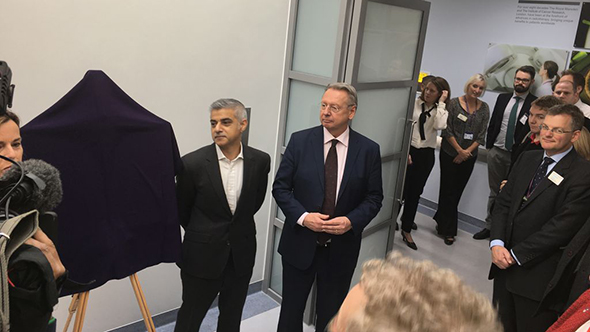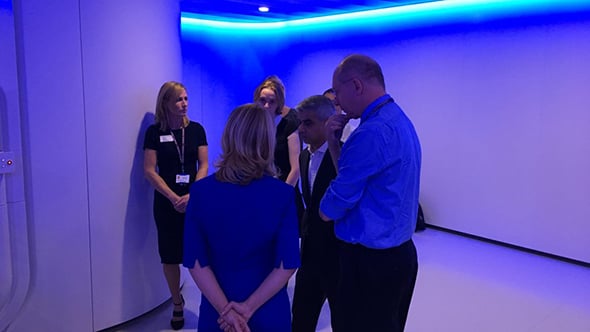WATCH: How the newly installed MR Linac machine at The Royal Marsden NHS Foundation Trust and The Institute of Cancer Research, London has the potential to transform radiotherapy for cancer patients.
A pioneering new type of radiotherapy machine opened today by Mayor of London Sadiq Khan has the potential to transform the care of cancer patients by directing radiation even at tumours that move during treatment.
The MR Linac machine is the first technology to simultaneously generate magnetic resonance images and deliver X-rays — allowing radiotherapy to be adjusted in real time and delivered more accurately and effectively than ever before.
The Institute of Cancer Research, London, and The Royal Marsden NHS Foundation Trust are the first institutions in the UK to install an MR Linac machine, with the first patients due to be treated in the second half of 2017, initially through clinical studies in hard-to-treat cancer types.
The technology is set to set to make radiotherapy more effective and reduce its side-effects, by tailoring the radiation beam precisely to the patient’s anatomy during treatment.
Targeting moving cancers
It could be especially effective for cancers which move during radiotherapy or change position between scanning and treatment — for instance through breathing, bladder filling or bowel changes. Examples are lung, cervical, prostate, bowel and bladder cancer.
The installation of the MR Linac was made possible by a £10m grant from the Medical Research Council to the ICR, with additional support from The Royal Marsden Cancer Charity.

Mayor of London Sadiq Khan waits to open the MR Linac unit on Tuesday 22 November
Physicists at the ICR and The Royal Marsden have been actively developing the technology for several years as part of an international consortium led by a team at Utretcht Medical Centre and the company Elekta, which makes the MR Linac, and MR partner Phillips.
The UK team’s initial findings, published in the journal Radiotherapy and Oncology, have shown that it is possible to target radiation precisely at lung tumours with the MR Linac using real-time imaging.
The research shows that the system can be calibrated to deliver X-rays accurately in the presence of the distorting magnetic field used to generate MRI images — overcoming a key scientific challenge.
First studies next year
The purpose-built treatment suite containing the MR Linac, based in the Radiotherapy Department at The Royal Marsden, will continue to be used to develop the technology ahead of the first clinical studies later next year.
As well as the MRC funding for the MR Linac project, scientists were also funded by Cancer Research UK for much of the preparatory research.
The Mayor of London Sadiq Khan said: “It’s a great honour to be involved in officially opening the MR Linac radiotherapy system. This truly groundbreaking device is the first of its kind anywhere in the UK and has the potential to transform the care that cancer patients receive. The MR Linac will give patients access to the most cutting-edge treatment available, which could help to save lives.
“The fact that The Institute of Cancer Research, London, and The Royal Marsden are among a select group of international centres developing this pioneering technology really underlines the fact that London is at the forefront of advances in medical research and innovation.”

Inside the facility, Sadiq Khan speaks with the ICR's Professor Uwe Oelfke and The Royal Marsden's Dr Alison Tree
Professor Uwe Oelfke, Head of the Joint Department of Physics at The Institute of Cancer Research, London, and The Royal Marsden NHS Foundation Trust, said: “Combining the excellent soft-tissue contrast of MRI scanning with precision radiotherapy in a single treatment technology has been one of the major challenges of modern radiotherapy research. The launch of our new system is an important step towards finally making this state-of-the-art treatment available for patients in the UK — with our first clinical trials due to begin in about a year’s time.
“By doing accurate patient imaging at the same time as delivery of radiotherapy — rather than as separate steps — we aim to significantly improve treatment for patients with hard-to-treat cancers including lung cancer.”
‘State of the art’
Professor Paul Workman, Chief Executive of the ICR, said: “The MR Linac is our flagship project in a programme of research to apply state-of-the-art technology to create smarter, kinder forms of radiotherapy.
“We believe the new system can revolutionise treatment by delivering beams of radiation precisely to tumours, even as they shift slightly in the body cavity, and so avoid potential harm to healthy tissue.
“We’re delighted at the ICR and The Royal Marsden to be one of the first centres in the world to have access to this technology, and extremely grateful for the support of the MRC in making it happen.”

From left to right: Paul Scully (MP for Sutton and Cheam), Ruth Dombey (Leader of Sutton Council), Cally Palmer (Chief Executive of The Royal Marsden), Sadiq Khan (Mayor of London) and Professor Paul Workman (Chief Executive of the ICR).
Dr Nick Van As, Medical Director at The Royal Marsden, said: “The MR Linac will give us the opportunity to realise our vision for radiotherapy of the future. Tumours and organs can move and change shape while we deliver radiotherapy which means we have to irradiate a safety margin to ensure we hit the target every time.
“The superior imaging of the MR Linac will allow us to treat with a greater level of accuracy and to adapt our radiotherapy treatment on a daily basis, meaning less normal tissue is irradiated. This will minimise damage to the normal tissues and safely give us capacity to prescribe higher radiation doses to the tumour, hopefully leading to more effective treatment.”
Dr Declan Mulkeen, Chief Science Officer of the Medical Research Council, said: “This was part of a £150 million UK-wide initiative to bring state-of-the-art experimental technologies into UK medical research. The MR Linac collaboration is a great example of a partnership across excellent academic research, charities and industry to drive the development of new ways to diagnose and treat disease.
“It’s this multidisciplinary approach which has helped make the UK a leader in clinical research.”
Sarah Haywood, CEO at MedCity said:
“London and the south east has long been at the forefront of scientific innovation and I’m delighted that this pioneering technology could transform the treatment of those affected by this unpredictable disease.
“The MR Linac will be central to the new London Cancer Hub, which is bringing together thousands of scientists to accelerate the discovery of new treatments and helping to maintain our status as world-leaders in life sciences.”
- Visit our MR Linac page for more information relating to this project